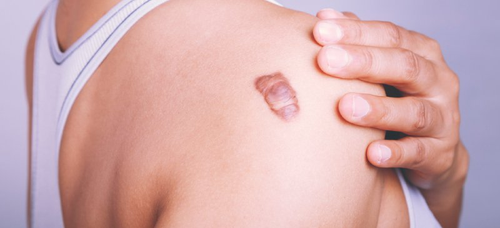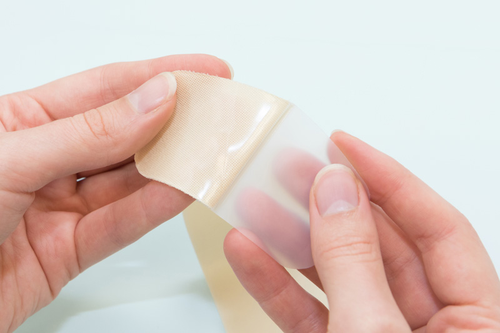Get to Know What Keloids Are and Ways to Get Rid of It
Keloid is an unpleasant mound of thick scar tissue that spreads beyond the region of scars due to an eagerly aggressive healing response to a wound. The skin can break, i.e. have a small open wound owing to scratches, cuts, bites, burns, something as innocuous as acne or piercing. The body naturally starts producing collagen to fill up the scarred area. However, sometimes the signal to the cells to stop producing of more collagen is not generated, and collagen proliferation continues. Cells deposit this material beyond the scar area resulting in hard, pinkish, rubbery top tissue formation above the skin level and extending beyond. The million-dollar question for those who get it is how to get rid of a keloid?

Let's Explore the Best Remedies for Getting Rid of Keloids
1. Proven home remedies
The points mentioned below will help you in reducing the size of existing scars. Once it has reduced, you may go for medical treatments to remove these unwanted collagen mounds completely (almost).
- Silicone gel sheets
These gel pads are a popular method of shrinking the existing keloid. International Journal of Cosmetic Science and Journal of Cutaneous and Aesthetic Surgery, both well-known bodies, have empathetically stated that applying gel sheets, aka scar sheets, shrink the existing mounds in both height and size. Better news for you is that they even reduce the formation of new keloids at scar positions.
These silicone gel sheets are available as self-pasting, reusable patches in most pharmacy stores and online retails. Use them 10 hours a day over the scar areas to minimize chances of overproduction of collagen. The commonly available brand is "Scaraway”.
- Vitamin E
Many believe that Vitamin E capsules, crushed and then applied the inner Vitamin E oil to the keloids, help. It is also available in cream form. Apply it over the scar area over 2-3 months, to prevent keloid formation as the scar heals quickly, over a couple of months. It is suited for home remedy because these Vitamin E capsules or creams are easily available in big grocery or chain stores.
- Cream lotions
Creams, which have ingredients like "lanolin” or "Petrolatum”, can help in arresting keloid formation. Apply it over the scar area whenever it starts to heal. People should use the creams regularly and cover the scar as the wound is healing.
- Ointments
As medical science progresses, you avail the benefits of a new generation of creams and lotions. Topical creams and gels are available over the stores. They quickly heal the scars and thus reduce the chance of keloid formation. The active component in these creams is again silicon.
All the above-mentioned are home remedies, which decrease the keloid size. However, let us discuss how to get rid of a keloid instead of simply restricting it. Watch the video and find ways to remove it naturally.
2. Medical treatment
The medical treatments are effective in reducing and even eliminating keloids to a great extent. Let's go through some of them:
- Laser treatment
It is a relatively new form of waging war against the formidable keloids. Please note that the type of laser light application varies. Better, consult your dermatologist to ascertain whether the laser light will be applicable for your type, if so then the type of laser needed. These lights cut off the supply source for keloid cells and stimulate healing of the inflammation.
- Surgery
It is a no-brainer, which few people think of undergoing, but is an unavoidable option when the formation is aggressive. However, dangers remain of fresh keloid formation at the surgical scar site.
- Radiation therapy
This is not a stand-alone treatment. This radiation is normally applied after the surgery of keloid. Care is taken, so that cancer prone tissues are not exposed to the rays. Experienced radiologists are required for this treatment. Short course radiation therapy has shown good results in significant reduction of keloids.
Best Ways to Prevent It
- Avoid deliberate cuts
Think of those unsightly heaps of collagen when shaving, piercing or uprooting that acne. Perform these activities gently. Avoid altogether piercing of earlobes, bursting the acne, etc., if there is a family history. Follow the same rules and avoid tattooing of the body. Use a sticker instead.

- Avoid too much sun exposure
Ultraviolet rays exacerbate the open wound or scars. So cover the wounded area when you go outdoors. Be careful and use a sterile bandage. Use sunblock if you cannot cover the scar area practically. Follow this regime for about one and a half year in adults and about six months in case of a child.
- Avoid cosmetic surgery if possible
Keloids have this notorious habit of appearing in any scar area. Cosmetic surgery will make you beautiful, but are you sure that it would not be marred by new keloids? Consult a doctor before the surgery, so that he can apply cortisone injections and sterile strips to allow fast healing of the wound post-surgery. Remember to follow the post-surgical advice in every little detail.
- Practice proper wound care
The quicker the inflammation takes to heal, the lesser will be the chances of keloid formation. So, follow a proper scar-healing regime. It is easy. Apply healing cream and keep the open wound protected by using sterile petrolatum bandages. Consult a dermatologist if you expect chances of keloids formation. He will guide you regarding the time when you can start applying silicone gel or pads on your wounds. Silicone has been at the forefront of common home remedy for keloids.
One has to admit that keloids are aliens who overstay. However, you can stop them from invading your skin at the very onset. If you already have keloid problems running in the family, consult a dermatologist whenever you find an open cut. Timely action from the very start will reduce the keloids to a minimum and can even prevent it from occurring.
YOU MAY LIKE
-
Best Tips to Get Rid of Milia
-
Top 9 Proven Ways to Get Rid of Head Lice
-
How to Treat a Boil - Best Home Remedies
-
Key Causes and Best Remedies for Itchy Bum Hole
-
Coconut Oil: A Cure for Yeast Infections
-
Wondering How Long Does Sunburn Last?
-
Brown and White Crusty Spots on Skin: Top Causes and Treatments
-
Yeast Infection: How Long Can It Last?
-
Bumps on Your Vaginal Area After Shaving
-
Best Tips to Remove and Prevent Burn Scars on Skin
